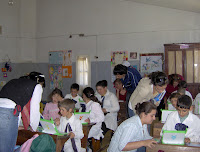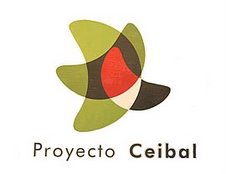Originally published by Pablo Flores on Thurs, Dec 27th, 2007
Translated by Paul D. Spradling
 This article was written by Gustavo Ochoa, a volunteer who participated in the handing out of laptops a few weeks ago. It’s worth it!
This article was written by Gustavo Ochoa, a volunteer who participated in the handing out of laptops a few weeks ago. It’s worth it!
Today is a time of renovation. Changes that are hard for us to start making. Because the same thing is happening to us with Varela, José Pedro, than with Varela, Obdulio.
The myths of Maracaná and the public school load us with obligations to the past and obstruct our view and ability to take action on what is ahead.
However, if we don’t close our eyes and put faith in the construction of a new vision, we are presented with opportunities that can show us part of the way.
Because with no vision there is confusion. And today we are lacking a slogan for education in which we can believe in, and bet our effort and will on.
Plan Ceibal is, without a doubt, one of these opportunities.
But you have to live the Plan Ceibal to understand it. It’s not possible to discuss if it’s OK, or if it’s opportune, or if a previous pedagogic project is required, or if it’s previously required to do this or that.
To understand Plan Ceibal, there is nothing better then to pass a day handing out laptops in the rural schools of the interior.
The doubts vanish after participating in this experience.
The Ceibal Plan is not an educational plan; it’s a plan of equity. The Varelian Reform was, among other things, also a plan of equity.
“All Uruguayans have the right to posses the tools that allow them to read books and access the ideas in them; and to carve themselves a better future with this access”, said Elbio Fernández.
“All Uruguayans have the right to posses the tools that allow them to access the global information highway and the ideas that circulate through it; and to carve themselves a better future with this access”, say those who impulse the Plan Ceibal.
There are many analogies that make me think that we’re upon a historical moment similar to that of the late 19th century. We are upon one of those moments that you can’t let pass.
We haven’t had, in the last 130 years, an opportunity to participate in a change so important for education as the one we’re developing today. Although many don’t see it yet.
That is why I decided to incorporate myself in the group of volunteers that went to hand out computers in the department of Florida. I leave you with my experience:
I arrived to LATU (Uruguay’s Technological Laboratory) before 8:00am on the cool morning of last Thursday. I asked the doorman where the volunteers met; he pointed to front of the Ingenious building, the area where innovative companies incubate. There were about half a dozen, half awake, high school kids (probably juniors and seniors) waiting there.
I introduced myself and found out that most of them where from High School #10, there were also a few from HS#15.
There was also a veteran, like myself; an engineer that was with the Open Source Center. Fernanda, a literature teacher and militancy partner from around 1983, arrived a while later. Pedro, a student, and Gabriela, a recent Telecommunications graduate, arrived later; they were both contracted by the Plan Ceibal to coordinate and supervise the handing out of the laptops
with the volunteers.
“Today we’ve got Chamizo, the rural area of Chamizo and Fray Marcos”, said Gabriela once inside the vans and on our way, “We’ll split up between the rural schools of the area and the schools in the towns I mentioned. We’ll form 3 teams in charge of you guys who are the adults.”
Some of the kids where already repeating the experience.
“This is the third time I come. I like anything that’s volunteer”, commented Leticia, a pretty, 17 year old brunette and a Senior in HS#10.
Ricardo, also from HS#10 and volunteering for a second time, was a real reference. You could see the capacity of organization and the seriousness with which these kids took the work.
The morning was clear and warm when we got to Fray Marcos, very pleasent.
School #45 was the town’s main building. Important in its two floors, but humble nonetheless. The park was across the street, with Artigas’ bust, a shady spot, calm, beautiful.
The post office vans were parked in the shade, waiting with precise logistic, with the precious cargo of computers that came directly from the port. And behind the gates were the looks of hundreds of kid’s little eyes.
And Mirta Mendieta, the Principal, who came out to receive us with a smile. “We’ve been waiting for you, the kids are very anxious.”
Gabriela goes through the formalities and signs the receipts with the Principal and the Post Officers, who had already unloaded the boxes. She took the other two teams and the necessary computers and left Ricardo, Francisco, Florencia, Stefanía and the veteran who’s speaking to you, to cover school #45. The school has almost 400 students, distributed in two classes per grade, from 1st to 5th grade, and one 6th grade class; a total of 11 classes plus the 2 ‘initial education’ classes.
We advanced through the halls of a well-lit and ventilated school; but you could see the effects of time and the difficulties in maintenance. Two beautiful and large classrooms in the 2nd floor were empty. “We weren’t able to use them this year and had to squeeze the 4th years into a deposit with no ventilation. When it rains, being in those classrooms it’s like standing outside. The isolation is very old, made in base of asphalt and fiberglass that are now expired. There is also no electricity on the second floor.”
Mirta told us about her worries and hopes as Principal. “We’re working on the roof, I’m showing it to Florit today so he can lend me a hand.” Héctor Florit arrived in a different vehicle than ours; he participated in the day’s activity, integrating with the handout and having lunch with the volunteer team.
working on the roof, I’m showing it to Florit today so he can lend me a hand.” Héctor Florit arrived in a different vehicle than ours; he participated in the day’s activity, integrating with the handout and having lunch with the volunteer team.
We began with 2A. The classroom’s door was shut; it had no windows. When it opened, forty eyes looked at us and smiled. “Do you know what we’re here for today?” we asked as we entered. They respond in unison, “yesssssss!!!! To bring the computers."
We organized the handout and asked for a round of applause for the first little girl who received her laptop. They all clapped as each of them came to the front at our call. The calling reminded me of my childhood, of the roll-call in my class; I called them as my memory told me to: first the two surnames, pause, then the two first names in rapid succession.
The kids looked at the computer, the manual, the power brick, and waited for the others. But their anxiety to start opening, touching and looking beat them; clusters formed around each computer, where everyone observed over the owner's shoulders.
We weren’t done handing them out, and already some computers were already on, they had entered their access codes, and lauched the diverse applications.
“How many of you have computers in your homes?” The count of hands did not surpass 5 or 6, in the class of 30. The volunteers from HS#10 spread out across the tables and began explaining the basics; most of all, they were responding to individual questions.
But the cellular reproduction began immediately; unstoppable, spontaneous and geometric.
By using the old method of observing those who know, in less then 10 minutes they all had started their computers and found their favorite program.
An interesting observation: the games were not the first and most visited programs.
The most solicited, the question we heard the most was: “Mister, mister, how do I put music on?”
The second: “Mister, mister, can you teach me how to take pictures?”
The third: “Where are the games?” And the forth: “what do I have to do to write?”
But please, pause the reading for a moment and imagine the surroundings and the atmosphere: the questions came 40 at a time. They were directed at each of the team members, and also of course to the teacher, who with caution and aware of her own doubts and insecurities regarding the technology, always had an answer for the kids; even if it was immediately followed by a look of despair towards us.
They grabbed your arm, spoke one over the other and repeated the same question every minute.
Then we began: “Who was a able to take pictures?” A few answered, “me, me”, followed by my instructions: “OK, you teach him, and you teach her over there, who are asking for help on that which you know how to do.”
Fernanda looks at them and asks us if this experience was useful to for us to value the work of teachers.
None of the kids noticed when the team left to handout the rest of the laptops in the other classrooms.
“The thing is, after you give them the laptop, you seize to exist”, told me Pedro Arzuaga, an engineer who had already participated before.
We repeated the same with the other classes, with the same looks, the same laughs, the same shouts, the same applause, the same anxiety to have, to touch, to learn, to play.
“It’s the first time the kids cheer because recess is over” said the Pincipal at lunch.
Luis Garibaldi arrived in the afternoon and, doing as Florit, integrated in the handouts and participated in the explanations on the use of the machines to the kids. They both took a look at the situation and saw that it was far from being caos; the teachers and students rapidly took the tool into their hands and started establishing usage patterns.
Finally, we gave the computers to the “initial education” teachers and to Mirta. The work was done by 5 o’clock in the afternoon.
All the kids formed a line in the yard, as they do everyday, but today they had a special smile. They all carried their green carrying-case in their hands, and not in their backpacks. They all wanted to show it off, to their dad who waited outside, to their brothers, who knows.
A girl on her bike carried it in the shopping basket.
And like this technology integrated into Fray Marcos’ life today. Every kid now begins a new path, similar to the one the kids from Cardenal have already gone through. Surprising the world by uploading, with rural candor, the birth of a calf or the slaughter and fabrication of sausages to YouTube. They will be seen by hundreds of people around the world who have never been out of their city.
Because if there were doubts on the possibility of creating content by the mere handout of these computers, these doubts have now seized to exist. The children themselves will surprise as photographers, as journalists, as investigators. And they will communicate with the world without asking for anyone’s permission.









